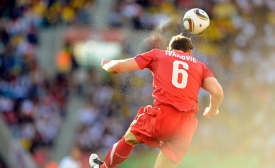sports diplomacy
Israeli cyclist Roei “Jinji” Sadan, who has spent the past four years crossing 42 countries on six continents, reached his final destination. Sadan, 29, arrived at the Sydney Opera House Thursday afternoon on his 27-gear, custom-built, blue-and-white bicycle sporting the Israeli and Australian flags.

Sherine B. Walton, Editor-in-Chief
Naomi Leight, Managing Editor
Tracy Bloom, Associate Editor
Very few Australian sports stars achieve global recognition but those who have bear witness to the great responsibilities that come with that recognition. Whether he seeks it or not, Evans will be seen as an ambassador for Australia and Australian values.In many respects his story to success is typically Australian.
Australian diplomats and policy-makers were no doubt watching as Australian cyclist, Cadel Evans edged past Luxembourg rival Andy Schlek to win the prestigious Tour de France earlier this week. They may well hope for a repeat performance when Australia faces Finland and Luxembourg next October in the contest for one of the two available seats on the United Nations Security Council (UNSC).
For nations like Australia, consistent policy delivery, both in the international and domestic arenas sits inevitably at the core of its reputation, and its campaign. Strong policy is a fundamental platform from which a nation’s reputation is communicated and understood. Nothing speaks more clearly to the identity, values and intent of a nation that its actions and performance in this space.
The U-20 is Colombia’s biggest-ever international sports event. This time around, the country is embracing the challenge. The games will be played in Bogota, Medellin, Cartagena and five other cities and watched on TV by 500 million people around the world. Spectators will learn about the country’s improved security, booming economy and natural beauty.
In the face of tough global economic conditions, Johannesburg Convention & Events Bureau - a division of the JTC - remains focused on aggressively promoting the city as a leading global destination for business, sports and events tourism, as it is a key driver for economic growth and development.
One area in which there is no question and no hedging is in the area of soft power. The United States is perceived as a symbol of freedom, empowerment and the pursuit of happiness. Sports are core to this message and they connect people around the world regardless of race, religion, economic status or nationality.







